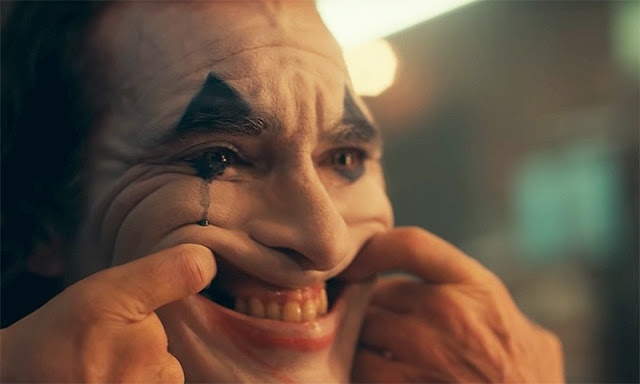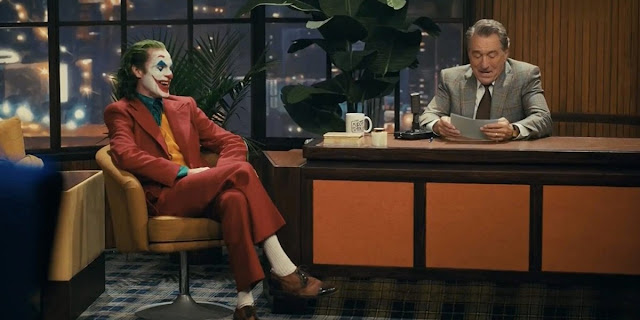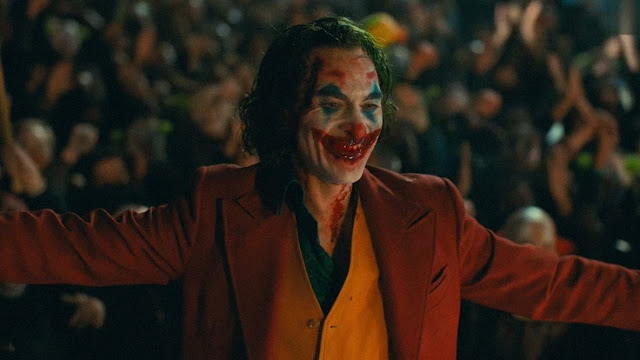“The worst part of having a mental illness is people expect you to behave as if you don’t.”
This profound statement, written in Arthur Fleck’s personal notebook, gives us just a glimpse into one of the main themes that drives Todd Phillips’s 2019 drama Joker. The film took the world by storm when it hit theaters and there were real world fears that it would incite violence and incourage incels. Police were stationed at some theaters showing the film, a precautionary measure in case someone took this release as a call for a repeat of the theater shooting that happened during The Dark Knight’s release. The political climate at the time was in a state of unrest with protesters fighting against the current president of the United States and what he represented. Now, five years later, a sequel titled Joker: Folie à Deux is set to hit theaters during a time when the same kind of political unrest is hitting the nation, its release date less than a month before a particularly hostile presidential election.
Todd Phillips initially seems like an odd choice to make a film so steeped in violence and mental instability. He was primarily known for his broad comedies like The Hangover Trilogyand Old School, all raunchy but shallow comedies that have a following but are about as deep as a wading pool. People forget, though, that he started his directorial career back in the early 1990’s with a very disturbing documentary about GG Allin, a punk rock performer who was known for throwing feces into the crowd at his performances. Watching that documentary is an exercise in tolerance and makes any of the fictionalized stuff in Joker look tame in comparison. Todd may have been pigeonholed as a comedy director but he was more than capable of bringing to life a compelling drama about mental illness and a society that doesn’t care or take care of those suffering from it.
It’s obvious Todd was influenced by Martin Scorsese’s body of work when putting Jokertogether. This film has a flavor to it that seems almost cribbed from the likes of Taxi Driverand, more poignantly, The King of Comedy. Both films starred Robert De Niro who also makes an appearance in Joker. There is more than a little of Rupert Pupkin in this iteration of Joker including the unreliability of the narration. Todd takes these elements and crafts them into an atmospheric whirlwind of imagery, emotions and political finger pointing, making sure to punctuate his targets, sometimes a little too obviously, while also occasionally keeping us guessing what is and is not reality. Once we have gotten through the film in its entirety there is still a question as to how much of what we just saw actually happened. I’d like to think at least the majority of it did but there is a reading out there that poses all of it is nothing more than a insane dream playing out in the head of Arthur while he is committed to Arkham Asylum. That reading feels cheap and on par with writing off an entire season of Dallas as being just a dream.
The film is about Arthur Fleck (Joaquin Phoenix), a mentally ill and Impoverished man living with his mother in a run-down apartment in Gotham City. Arthur had been committed to Arkham Asylum at some point in the past but is currently back on the streets, dependent on medications to control his outbursts, medication he obtains through social services. Arthur works for a company that hires him out as a street clown, performing at hospitals for sick children or waving a sign out on the streets to entice business. On the side he performs stand-up at one of the local comedy clubs. One day some random kids steal his sign and, when he gives chase, they beat him to the ground. His boss is unsympathetic, accusing him of stealing the sign himself and garnishes his paycheck for the replacement. A seemingly sympathetic co-worker, Randall (Glenn Fleshler) gives Arthur a gun for protection but when he accidentally drops it while dancing for a group of kids in the hospital he is fired. Randall, in turn, insists that Arthur asked for the gun specifically.
With no place to go to change out of his clown outfit he is forced to ride the subway home in costume and ends up getting assaulted by three drunk businessmen. In self-defense he shoots and kills all three of them. The killings spark a media flurry, especially after their employer, Thomas Wayne (Brett Cullen), addresses it on television amidst his mayoral bid. Making matters worse is his response to the crime, referring to those who fail to make anything out of their lives as “clowns.” This sparks public outrage and protests by angry citizens wearing clown masks. The police show up at his apartment, wishing to interview him in connection to the murders but only find his mother at home. She responds violently to the questioning, suffering a stroke and ends up in the hospital. One of his stand-up routines gains attention when local late night talk show host Murray Franklin (Robert De Niro) plays a clip of it on his show, highlighting how painfully unfunny the act is. The clip gains enough attention that his publicist reaches out to Arthur about appearing on the show in person. Arthur accepts, thinking he will appear and commit suicide live on television allowing his death to make more “cents” than his life ever did.
There is a mid-film diversion where Arthur finds a letter from his mother to Thomas Wayne that states that he is Thomas’s son from an affair while she worked for him. This leads to a confrontation between the two men that seems to suggest this is not the case. A document in her mental health records seems to support that the two are not related, also. But the film leaves just a hint that that document could have been faked to hide the parentage. It is never definitively answered. This is just one of the many ways Joker plays with reality and tries to hide what is really going on. It would be an interesting choice to make Arthur Fleck a half brother to Bruce Wayne; this kind of thing has been utilized before with arch enemies in film franchises. It rarely works though and usually comes across as poor writing. Spectre did it with James Bond and Blofeld and that decision was almost universally hated, especially since the exact same plot twist was utilized in the James Bond spoof Austin Powers in Goldmember that came out seven years before. Joker at least leaves this concept undecided as the evidence seems to suggest that that relationship was nothing more than a delusion in his mother’s head.
What isn’t left vague is the relationship that builds between Arthur and his neighbor, Sophie (Zazie Beetz). They first meet in the elevator of their apartment building. Later they will begin a flirtation after she calls him out for following her around the city. This leads to her going to one of his stand-up shows and some casual dating. However it becomes apparent early on that none of this actually happens and that beyond the meeting in the elevator, and maybe him stalking her in the city, all the rest of their interactions are entirely in his head. This is confirmed when one evening he breaks into her, and her young daughter’s, apartment. She recognizes him but has obviously not been having any type of relationship with him. Whether or not he kills her in this moment is left to our imaginations. I tend to believe that he did as neither of them are in the rest of the film. However, Zazie Beetz is confirmed to be returning in the sequel so that assumption may be in error.
After the killing of the three businessmen in the Subway, Arthur seems to gain some confidence. This becomes even more so once the act becomes news and sparks the city-wide protests. Arthur’s attachment to reality is disintigrating thanks to budget cuts that eliminate his access to his social worker and his medications. Todd Phillips is not even trying to be subtle with his jabs at the social reforms going on in America that had these very real consequences. It may not be subtle but it is effective. His social worker, even when she was able to see him, gave him very little attention, asking the same questions of him every session and never really listening to what was really going on in his life.
The final straw for Arthur, though, is the public humiliation he gets on Murray Frank’s late show, showing Arthur that even Murray, a man he looked up to and imagined as a bit of a father figure, is a bad man. The invite to be on the show only further cements that opinion. He goes on the show intent on killing himself but instead confesses to the murders on the Subway. He also takes out his anger and outrage on Murray himself, an act that elevates the protests outside into a full on riot. There have been a couple of violent moments in the film, like his killing of Randall, but this is the first where the build-up to the violence is so filled with dread. Arthur uses his new platform to justify his actions and suggests that he is not being political in his appearance even though he most definitely is. He shows up on the show fully dressed up as a clown while the protests are going on outside. His speech also pushes his own narrative about society and how it treats the mentally defective including how Murray has exploited him just for laughs.
The final moments of the film can be interpreted several different ways. Arthur is seen being driven away from the studio in the back of a police vehicle that gets ran into by an ambulance driven by the rioters. He is carried out by them and propped up like a symbol of their anger. He then takes a finger and draws a big smile on his face in his own blood, spurning a big reaction from the crowd. We never see how he got in the car in the first place. It will cut again to him being in Arkham Asylum and we don’t know how he got there, either, or if he ever really left in the first place. The film ends with him walking down one of the halls leaving bloody footprints behind him, only to be chased around by some orderlies like he was in a silent comedy film. How much of the entire film actually happened? The film leaves that to our imagination.
This film struck a nerve with Academy voters when it released in 2019. It was heralded for being daring and taking a stab at some very serious social issues that are still going on long after the Reagan era set things in motion by cutting the budgets of important programs designed to help those with mental instabilities. Joaquin Phoenix secured an Oscar for his transformative portrayal as Arthur Fleck aka Joker, becoming the second actor to win one for the same part after the posthumous win by Heath Ledger the previous decade. All in all it received eleven Academy Award nominations winning just two. It was a polarizing film amongst audiences, many of whom felt it was too dark and violent while others praised it for not holding back. It was a daring film that told a compelling story and did it in the context of a comic book character. The interesting thing will be whether Todd Phillips can do it again. As of this writing the sequel is just a mere couple of weeks away from release. I guess we’ll find out if he can trap lightning in a bottle a second time.
Academy Award Nominations:
Best Picture: Bradley Cooper, Todd Phillips, and Emma Tillinger Koskoff
Best Director: Todd Phillips
Best Actor: Joaquin Phoenix (won)
Best Adapted Screenplay: Todd Phillips and Scott Silver
Best Cinematography: Lawrence Sher
Best Costume Design: Mark Bridges
Best Film Editing: Jeff Groth
Best Makeup and Hairstyling: Nicki Ledermann and Kay Georgiou
Best Original Score: Hildur Guðnadóttir (won)
Best Sound Editing: Alan Robert Murray
Best Sound Mixing: Tom Ozanich, Dean Zupancic and Tod Maitland
____________________________________________________
Release Date: October 4, 2019
Running Time: 122 Minutes
Rated R
Starring: Joaquin Phoenix, Robert De Niro, Zazie Beetz and Francis Conroy
Directed By: Todd Phillips









Comments
Post a Comment